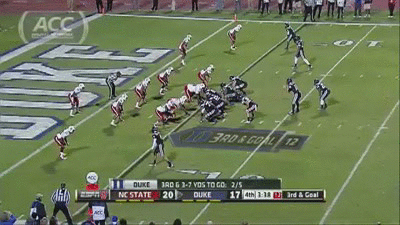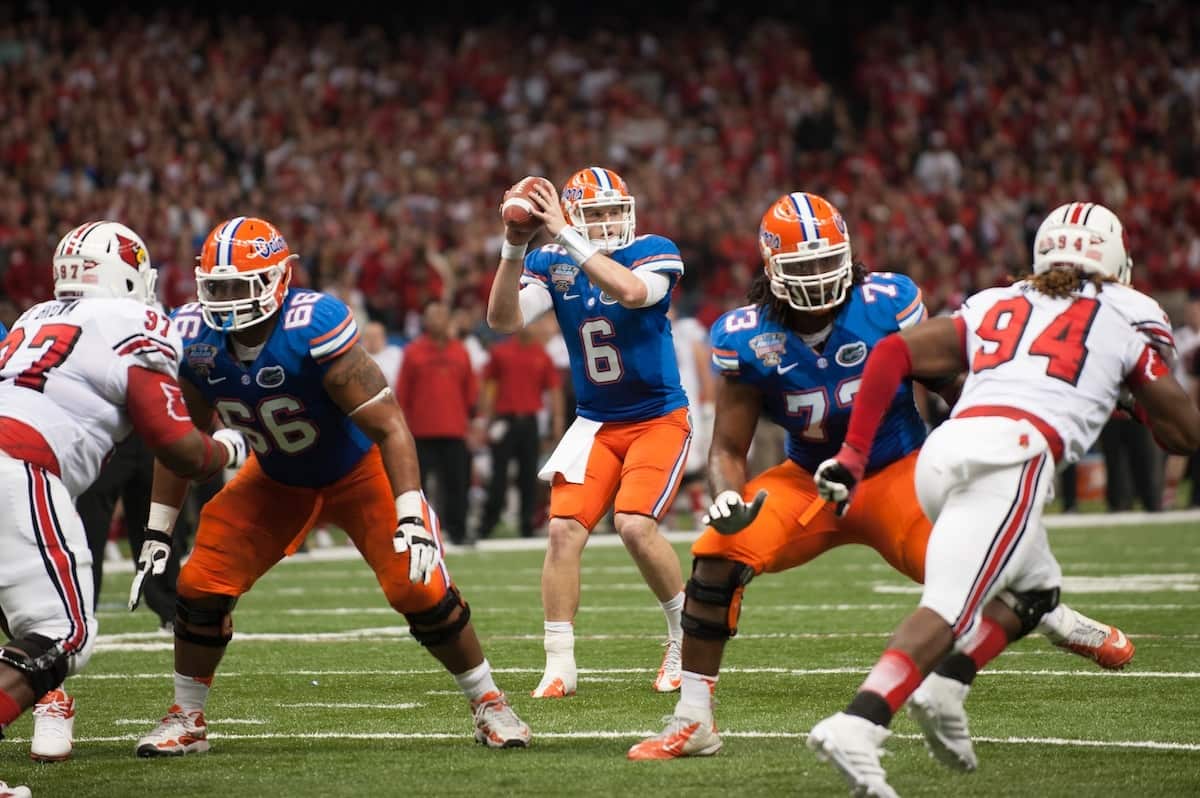The Gators have officially hired the third offensive coordinator in four years with official announcement that Duke University offensive coordinator Kurt Roper will serve in the same role at the University of Florida.
Kurt Roper will have the weight of the world on his shoulders, as he tries to help the University of Florida football program turn around an offense that has been ranked no better than 104th in the best three years.
When Brent Pease was fired after the loss to Florida State ended the Gators’ abysmal 4-8 season, nearly every college football analyst and fan opined on whom the Gators should hire and which names were the front-runners. When word came out on Christmas Eve that Roper would be hired, many Gator fans were both relieved that a hire had been made, but wondered who Roper was, other than what was known on paper.
Before we delve too deep into his play calling, it is important to know who Roper is, what is philosophies are, and how exactly he got chosen to take the reigns of the Florida offense.
Roper, a former quarterback and defensive back at Rice, began his coaching career right after graduating in 1995 with Mississippi State. A year later, Roper moved to the University of Tennessee under Phillip Fulmer where he served as a graduate assistant for two more seasons, and obtained his masters’ degree in the meantime. Roper left Tennessee for a full-time job at Ole Miss on the staff of former UT offensive coordinator David Cutcliffe. Roper coached quarterbacks from 1999-2001 and added the title of passing game coordinator from 2002-2004. During these six years, Roper helped guide Ole Miss to six bowl games and tutored qaurterback Eli Manning, who went on to become a number one draft pick and two-time Super Bowl champion with the New York Giants. When Cutcliffe and all his assistants were fired after the 2004 season, Roper landed at the University of Kentucky where he worked as the quarterbacks coach for offensive coordinator Joker Phillips, now the wide receivers coach at Florida. Roper was Andre Woodson’s quarterback coach that year. Woodson compiled a 110.16 quarterback rating for a 3-8 team.
A year later, Roper was back at Tennessee where Cutcliffe resurfaced as the offensive coordinator. Roper coached the running backs, working with Arian Foster, LaMarcus Coker, Montario Hardesty and Lennon Creer. After a 9-4 2006, and 10-4 2007 (SEC East Champion), Cutcliffe was hired as Duke University’s head coach. One of his first moves was to hire Roper as the offensive coordinator. In his six years at Duke with Cutcliffe, Roper helped turned a perennial bottom-feeder into the ACC Coastal Division champion in 2013. Roper was a top-5 finalist for the Frank Broyles Award, an award given to the top college football assistant.
During his coaching career at Duke, Roper has had five 3,000-yard passing seasons and four 1,000-yard receivers (the last 1,000 yard receiver Florida had was in 2002 – Taylor Jacobs).
Roper’s offenses have ranked 10th, 7th, 7th, 10th, 7th, and 6th in the ACC averaging 372.9 yards per game, an average that Florida has not had since 2009.
Roper, who is obviously a disciple of Cutcliffe, who is considered an offensive genius, has recently identified his philosophy (more analysis below) by a few major points. Primarily, Roper has maintained adapting to the players is vitally important saying, “The whole cliché on how it’s about players and not plays is obviously somewhat true. You’re trying to figure out what works. What are our guys capable of scheme wise? We’re working on different schemes and things like that.” And how does a player adapt? “Step one is just learning our plays, learning our terminology, learning our language. Step two is applying it to defensive schemes and things like that. Step three is applying it to game situations, score of the game, time in the game, down and distance, field position.” Finally, Cutcliffe wrapped up Roper in a simple statement saying, “His style would be intensity, tempo, and quality of repetition. From the minute they hit the field it’s gonna be intense.”
At Florida, just like at Duke, expect Florida to run an up-tempo offense. Over the past six years, Duke has averaged 887.16 plays per season, compared to Florida, which has only averaged 803 plays per season in the past three years since Will Muschamp took over the helm. Roper runs a spread offense (talked about more in-depth here), that relies upon the read option with short, non-complicated routes for wide receivers, primarily in one running back sets (often in shotgun), with a lot of no-huddle thrown into the mix.
But Dan, what does that look like?
I am glad you asked.
Below are a few examples of Roper’s offense and what you can expect to see.

In this play, the quarterback lines up in a shotgun formation with a running back to his right, who will serve as a gap blocker picking up a blitzing linebacker. This is the most basic formation in Roper’s offense, allowing for two receivers (X and Z) to run shorter routes, while his Y receiver runs a deep route along the sideline. Ultimately, his Y and Z receiver are quasi-open and a pass could be made to either.
 In this play, very similar to the last one, quarterback Anthony Boone lines up in the shotgun with his running back picking up a block on the zone read run for a touchdown.
In this play, very similar to the last one, quarterback Anthony Boone lines up in the shotgun with his running back picking up a block on the zone read run for a touchdown.
 Another zone read touchdown for Duke. The read works because the of the zone blocking scheme by the offensive line, which pushes the play right, allowing for a hole on the left side of the field
Another zone read touchdown for Duke. The read works because the of the zone blocking scheme by the offensive line, which pushes the play right, allowing for a hole on the left side of the field
 Here is the exact same play, just to the other side. See the offensive line zone blocking to the left leaving the right side of the field open for the quarterback option run.
Here is the exact same play, just to the other side. See the offensive line zone blocking to the left leaving the right side of the field open for the quarterback option run.
 Finally, you will see how the option play calling allows for a fake hand-off pulling the linebackers, cornerbacks and safety away from a roll-out, that allows for a completely wide-open wide receiver to catch an easy pass and score a touchdown.
Finally, you will see how the option play calling allows for a fake hand-off pulling the linebackers, cornerbacks and safety away from a roll-out, that allows for a completely wide-open wide receiver to catch an easy pass and score a touchdown.
All in all, Roper is going to call a lot of plays that have multiple options, giving quarterback Jeff Driskel the opportunity to make plays on the ground or in the air, but expect more through the air. In 2013, 57.5% of Duke’s total yards were through the air, in 2012 69.4% were through the air, and in 2011 74.3% of the yards came through the air. The Florida offense has been primarily a rushing attack over the past three years, so you can expect a shift in the offensive play calling philosophy from a run-based offense, to a more pass-heavy offense, although it will likely be more balanced than his offense at Duke.
There are still a lot of unknowns about how Roper will do at Florida, because according to his words, it’s about the players not the plays. Roper will have a veteran quarterback in Jeff Driskel, who has shown flashes of greatness, but has also struggled mightily at times, and is coming off of an injury. He will have a stable of very talented running backs and a talented, but unproven corp of wide receivers that have both speed and size, but lack production. Finally, Roper will have to deal with an offensive line that is talented, but has a major lack of depth.
Roper has the background, the pedigree, and the experience, but now has the weight of the Gator Nation on his shoulders. The hiring Kurt Roper was the most important decision of Will Muschamp’s career and will now be relied upon to fix an offense that could catapult his career or sink his boss.



I wonder how we could get such a high quality hire without Foley buying in to some longer term commitment than 1 year. I would have to believe that Roper wouldn’t come to the Gators if he wasn’t assured that he would have more than a year to get us back on track. Can one of the insiders tactfully ask that question?